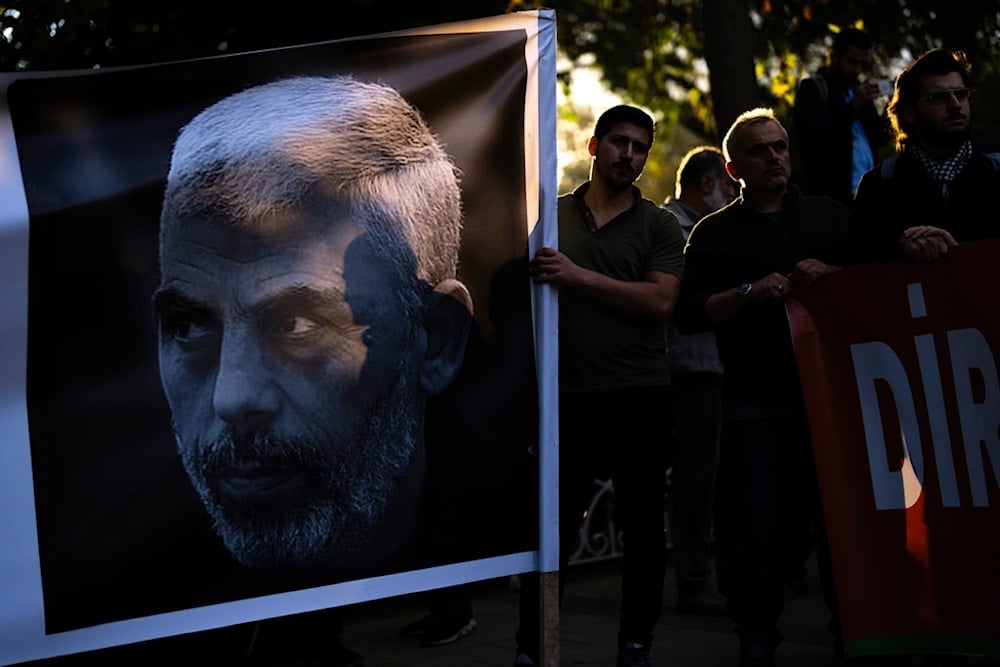Iran FM meets with top Hamas officials, reiterates support for Gaza
Iranian Foreign Minister Abbas Araghchi voices his solidarity with the Palestinian Resistance as he meets with top Hamas officials and offers his condolences for the martyrdom of leader Yahya Sinwar.
-

A man holds a banner with a photograph of martyred Hamas leader Yahya Sinwar during a pro-Palestinian protest in Istanbul, Turkey, Saturday, October 19, 2024 (AP)
Iranian Foreign Minister Abbas Araghchi met with members of the Hamas Political Council, including Mohammad Ismail Darwish, Khalil al-Hayya, and Mousa Abu Marzouk, in Istanbul, Turkey, to offer condolences and express support following the martyrdom of Hamas leader Yahya Sinwar.
Araghchi conveyed the greetings of Iranian Leader Sayyed Ali Khamenei to the resilient and courageous Palestinian people, stating, "The blood of Sinwar and his fellow martyrs is a source of pride for the Islamic World and all the free people of the world. It guarantees the honorable resistance aimed at eliminating the Zionist regime's occupation and oppression, and achieving ultimate victory."
The minister attributed the ongoing crimes and aggression in Gaza, Lebanon, and other Islamic lands to "the irresponsible and illegal support of the Zionist regime by the United States and some Western countries."
He also praised the dynamism, strength, and vitality of Hamas and the Palestinian Resistance, saying that "despite the numerous Israeli crimes and assaults over the past year, these acts have only brought eternal shame and disgrace to the occupying regime and its supporters."
Mohammad Ismail Darwish, Head of the Hamas Political Council, expressed his deep gratitude to the Iranian Leader and the Iranian people for their steadfast support of the Palestinian resistance, which he said is based on Islamic principles, ethical foundations, and international legal norms.
Darwish reiterated the determination of Palestinian fighters to continue their legitimate struggle against the Israeli occupation and apartheid regime, affirming that the assassination of resistance leaders only strengthens the Palestinian people's motivation for resistance.
He emphasized the unity and cooperation among Resistance forces in the Islamic world, including in Yemen, Iraq, Lebanon, and Syria, which he described as a blessing resulting from the storming of the al-Aqsa Mosque.
Darwish also highlighted the dual crime perpetrated by the Zionist regime in Gaza, where the oppressed people are kept hungry and deprived of essential food and medical supplies. He called on Islamic nations and international organizations to mobilize in support of the beleaguered population in Gaza.
Araghchi is currently on a regional tour, visiting several countries including Lebanon, Syria, Saudi Arabia, Oman, Qatar, Iraq, Jordan, and Egypt. The tour is focused on "de-escalation efforts and achieving peace in the region amid ongoing tensions and developments."
Iran to respond to any Israeli aggression
Speaking with Turkish broadcaster NTV on Saturday, Araghchi underlined that any attack on Iran crosses the red line, which Tehran will not leave unanswered
"The necessary response will be given to any attack on Iran's nuclear facilities or any similar attack," he stressed, adding that "Israel will receive a symmetric response to any attack on Iran."
Araghchi explained that during the last retaliatory attack conducted by the Islamic Revolution Guard Corps (IRGC), 90% of the missiles fired by Iran reached their Israeli targets. He also highlighted the fact that Iran did not strike any Israeli economic or civilian facilities.
"Now, we have identified all our targets in Israel," the top diplomat said, warning that "If Israel attacks, we will launch a similar attack on their targets."
When asked about why "Israel" has still not responded to the previous operation by Iran, the minister cited the immense diplomatic pressure the entire world was putting on "Israel".
"A full-scale war is highly likely to break out in the region...Countries are making significant diplomatic efforts at the regional and international levels," he revealed.
"I believe that diplomacy must be used to stop Israeli attacks and declare a ceasefire to prevent a large-scale disaster in the region," the foreign minister added, "Only then can we talk about the well-being of the residents of the Gaza Strip and Lebanon."

 4 Min Read
4 Min Read








